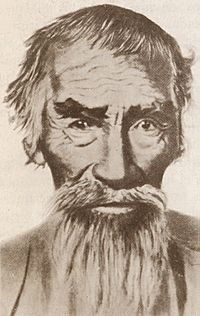Huarpe facts for kids
|
Member of the Milkayak Huarpe ethnicity
|
|
| Regions with significant populations | |
|---|---|
| Argentina (Cuyo) | |
| Argentina | 34,279 |
| Languages | |
| Spanish; formerly Quechua and Huarpe | |
| Religion | |
| traditional tribal religion | |
The Huarpe (say: WAH-r-peh) people are an original group of people from Argentina. They live in the Cuyo region, which is a part of Argentina. Some people think the word "Huarpe" means "sandy ground" in their old language. The word "Cuyo" itself comes from an old language called Araucanian. It means "sandy land" or "desert country."
Contents
The Huarpe People's History
Early Settlements and Farming
The Huarpe people started living in permanent villages around the 5th century CE. These villages were usually home to about 50 to 100 people. This made them smaller than the villages of the Diaguita people.
The Huarpe were agrarian people, meaning they grew their own food. They farmed important crops like corn (also called maize), beans, squash, and quinoa.
Expanding Territory
By the 15th century, the Huarpe territory grew. It included parts of what are now the Argentinian provinces of San Luis, Mendoza, and San Juan. Their land even reached the northern part of the Neuquen Province.
They lived between the Jáchal River in the north and the Diamante River in the south. Their lands stretched from the Andes mountains to the Conlara Valley in San Luis.
Inca Influence
The Huarpe people were never fully part of the powerful Incan Empire. However, they were influenced by Inca culture. After 1480, they started raising llamas. They also began to use the Quechua language, which was spoken by the Incas.
Spanish Arrival and Changes
When Spanish settlers arrived, some Huarpe people were moved to Chile. There, they worked for Spanish settlers who had been given land and people in the Cuyo region.
See Also
In Spanish: Huarpes para niños


